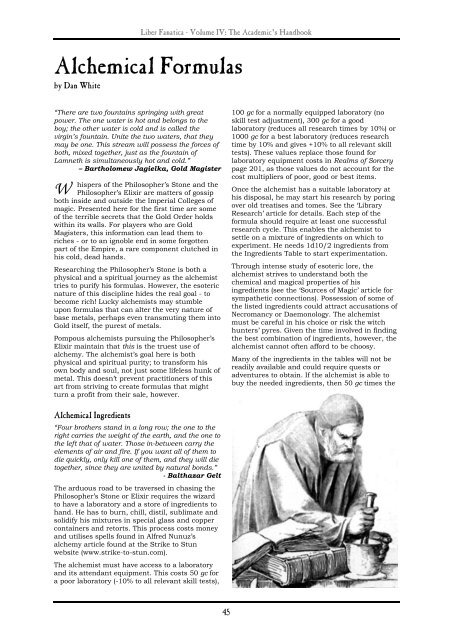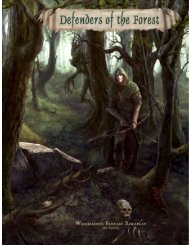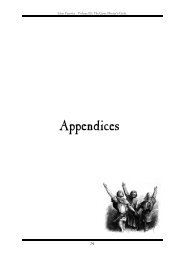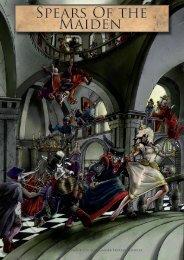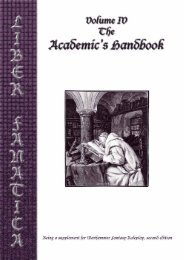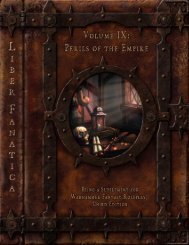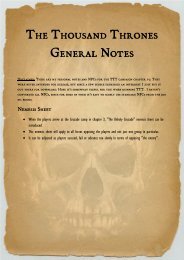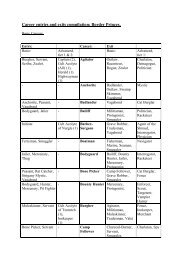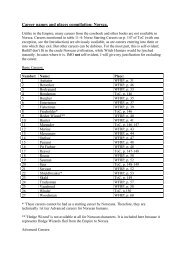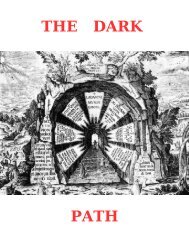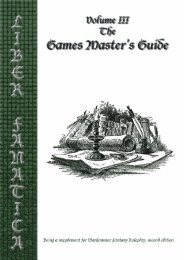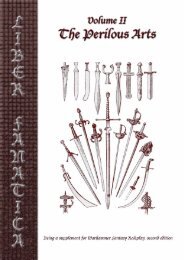1.56 MB Download - Liber Fanatica
1.56 MB Download - Liber Fanatica
1.56 MB Download - Liber Fanatica
Create successful ePaper yourself
Turn your PDF publications into a flip-book with our unique Google optimized e-Paper software.
<strong>Liber</strong> <strong>Fanatica</strong> - Volume IV: The Academic’s Handbook<br />
Alchemical Formulas<br />
by Dan White<br />
“There are two fountains springing with great<br />
power. The one water is hot and belongs to the<br />
boy; the other water is cold and is called the<br />
virgin’s fountain. Unite the two waters, that they<br />
may be one. This stream will possess the forces of<br />
both, mixed together, just as the fountain of<br />
Lamneth is simultaneously hot and cold.”<br />
– Bartholomew Jagielka, Gold Magister<br />
W<br />
hispers of the Philosopher’s Stone and the<br />
Philosopher’s Elixir are matters of gossip<br />
both inside and outside the Imperial Colleges of<br />
magic. Presented here for the first time are some<br />
of the terrible secrets that the Gold Order holds<br />
within its walls. For players who are Gold<br />
Magisters, this information can lead them to<br />
riches - or to an ignoble end in some forgotten<br />
part of the Empire, a rare component clutched in<br />
his cold, dead hands.<br />
Researching the Philosopher’s Stone is both a<br />
physical and a spiritual journey as the alchemist<br />
tries to purify his formulas. However, the esoteric<br />
nature of this discipline hides the real goal - to<br />
become rich! Lucky alchemists may stumble<br />
upon formulas that can alter the very nature of<br />
base metals, perhaps even transmuting them into<br />
Gold itself, the purest of metals.<br />
Pompous alchemists pursuing the Philosopher’s<br />
Elixir maintain that this is the truest use of<br />
alchemy. The alchemist’s goal here is both<br />
physical and spiritual purity; to transform his<br />
own body and soul, not just some lifeless hunk of<br />
metal. This doesn’t prevent practitioners of this<br />
art from striving to create formulas that might<br />
turn a profit from their sale, however.<br />
100 gc for a normally equipped laboratory (no<br />
skill test adjustment), 300 gc for a good<br />
laboratory (reduces all research times by 10%) or<br />
1000 gc for a best laboratory (reduces research<br />
time by 10% and gives +10% to all relevant skill<br />
tests). These values replace those found for<br />
laboratory equipment costs in Realms of Sorcery<br />
page 201, as those values do not account for the<br />
cost multipliers of poor, good or best items.<br />
Once the alchemist has a suitable laboratory at<br />
his disposal, he may start his research by poring<br />
over old treatises and tomes. See the ‘Library<br />
Research’ article for details. Each step of the<br />
formula should require at least one successful<br />
research cycle. This enables the alchemist to<br />
settle on a mixture of ingredients on which to<br />
experiment. He needs 1d10/2 ingredients from<br />
the Ingredients Table to start experimentation.<br />
Through intense study of esoteric lore, the<br />
alchemist strives to understand both the<br />
chemical and magical properties of his<br />
ingredients (see the ‘Sources of Magic’ article for<br />
sympathetic connections). Possession of some of<br />
the listed ingredients could attract accusations of<br />
Necromancy or Daemonology. The alchemist<br />
must be careful in his choice or risk the witch<br />
hunters’ pyres. Given the time involved in finding<br />
the best combination of ingredients, however, the<br />
alchemist cannot often afford to be choosy.<br />
Many of the ingredients in the tables will not be<br />
readily available and could require quests or<br />
adventures to obtain. If the alchemist is able to<br />
buy the needed ingredients, then 50 gc times the<br />
Alchemical Ingredients<br />
“Four brothers stand in a long row; the one to the<br />
right carries the weight of the earth, and the one to<br />
the left that of water. Those in-between carry the<br />
elements of air and fire. If you want all of them to<br />
die quickly, only kill one of them, and they will die<br />
together, since they are united by natural bonds.”<br />
- Balthazar Gelt<br />
The arduous road to be traversed in chasing the<br />
Philosopher’s Stone or Elixir requires the wizard<br />
to have a laboratory and a store of ingredients to<br />
hand. He has to burn, chill, distil, sublimate and<br />
solidify his mixtures in special glass and copper<br />
containers and retorts. This process costs money<br />
and utilises spells found in Alfred Nunuz’s<br />
alchemy article found at the Strike to Stun<br />
website (www.strike-to-stun.com).<br />
The alchemist must have access to a laboratory<br />
and its attendant equipment. This costs 50 gc for<br />
a poor laboratory (-10% to all relevant skill tests),<br />
45


